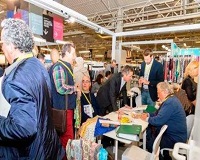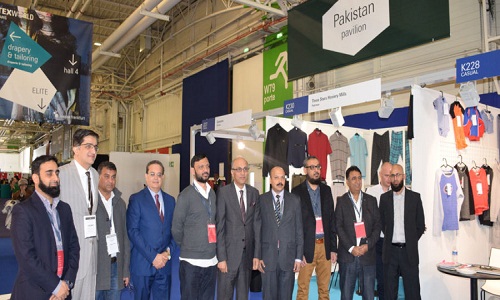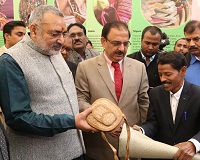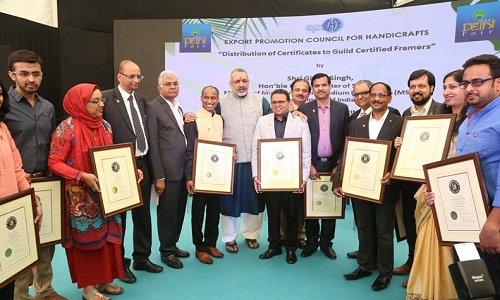FW
As the bridge between Europe and Asia, Turkey remains the central hub for the textile manufacturing industry, making the 2018 ITM textile machinery exhibition which will take place from April 14-17.
The company will provide information on the latest developments for its advanced Montex stenters, which have already proved highly successful with Turkey’s leading textile manufacturers.
Integrated heat recovery and exhaust air cleaning systems are two of the latest innovations that ensure manufacturers maximise production and keep energy consumption down, by containing and recycling both process heat and exhaust fumes. These devices can now be integrated into the design of complete finishing lines without the need for additional floor space.
Intuitive, fingertip control of all parameters is provided with the latest Qualitex 800 PLC-controlled visualisation system and its accompanying 24-inch monitor system.
Other industry-leading Monforts systems now finding rapid acceptance with manufacturers include the texCoat modular coating unit, offering an unprecedented range of coating options, and the Eco Applicator – an alternative to the traditional wet padder for significantly reducing energy and raw material costs.
The government needs to resolve the issue of illegal hybrid cotton seeds being sold in the country. Around 3.5 million packets of these illegal herbicide tolerant (HT) seeds are estimated to have been sold in the country in kharif 2017.
As about 40 million legal Bollgard II seeds are sold by Monsanto, this means illegal seeds are around 8-10 per cent of the total. The number of illegal seeds, according to South Asia Biotechnology Centre (SABC), have increased the problem of resisting weeds and are responsible for the new threat of pink bollworm that devastated the cotton crop.
SABC noted, “Widespread cultivation of substandard and spurious Bt cotton and illegal HT cotton is spoiling the technology as the management of such improved technology needs proper supervision and control …”
Monsanto first complained, about illegal HT seeds coming into the country, to the Genetic Engineering Approval Committee (GEAC) about ten years ago.
The government felt Monsanto’s Bolgard II seeds were too expensive and in December 2015, it came out with a seed price order that reduced the price from Rs 930 per bag to Rs 800 and also reduced Monsanto’s royalty from Rs 170 to Rs 49.
Yet, while the government wanted to keep prices low for Indian farmers, as SABC points out, the illegal HT seeds are selling at between Rs 1,200 and Rs 1,500 per pack, this works out to an average of 1.7 times Monsanto’s Bollgard II seeds.
If farmers were paying so much, it is because they felt the seeds would help increase productivity by reducing the cost of weeding in the same way that Bollgard II did.
It is claimed that because of Bollgard I and then II that India’s cotton production tripled from 13 million bales in 2002-03 to 35 million bales in 2016-17, and that is what, at one point in time, made India the world’s largest exporter of cotton.
Aquafil and H&M have teamed up to make sustainable fashion mainstream through the H&M Conscious Exclusive collection.
This JV marks the first time that the Conscious Exclusive collection showcases items made from Econyl yarn, which is Aquafil’s regenerated nylon made from waste diverted from landfills and oceans.
The collection’s is the shared vision, of two key industry players, for a more sustainable future. ‘May the force be with them.’ Giulio Bonazzi, CEO of Aquafil exults, “Aquafil is thrilled to have Econyl adopted by H&M’s Conscious Exclusive collection. This partnership represents great progress for the fashion industry and environment. Collaboration between brands and ingredient manufacturers is key. When we work together, it creates more sustainable options for consumers and a cleaner future.”
Launched annually, H&M’s Conscious Exclusive collection is comprised of high-end environmentally friendly apparel. The collection aims to steer H&M’s fashion and sustainability development towards a more sustainable (fashion) future.
This year’s collection will be available worldwide in stores and online from April 19, 2018 and features two laces dresses made from Aquafil. Cecilia Brännsten, Acting Environmental Sustainability Manager at H&M elaborates, “We’re proud to feature Econyl in this year’s Conscious Exclusive collection. At H&M, we’re constantly on the lookout for innovative materials and processes that can make our products more sustainable. The Conscious Exclusive collection has always been an important testing ground for us as it allows us to try out the latest sustainable fabrics on a smaller scale. On numerous occasions, we have incorporated them into our regular collections.”
Aquafil, a global producer of nylon yarn, launched the Econyl Regeneration System in 2011 to produce nylon made from 100 per cent regenerated waste. The nylon yarn, which can be regenerated an infinite number of times without any loss in quality, has been taken to heart by a large and growing number of sportswear, fashion, luxury and carpet brands, including Outerknown, Stella McCartney and Adidas.
The partnership marks a firm commitment by both brands to create a more sustainable world, while keeping fashion accessible for the average consumer.
Today, several designers and fashion brands are targeting a range of customers by creating luxury apparel at affordable prices — where earlier only the millionaires could afford.
Big brands such as Louis Vuitton, Prada and Versace are expanding to developing economies, which has not only enhanced their geographical reach but also managed to grab a larger consumer base who could earlier only desire to own them in fashion magazines such as Vogue.
The transparency market research report states that the opportunity in the global luxury apparels market will be valued at US$60,793.7 mn by the end of 2024 when compared to US$ 1,8842.69 mn in 2015.
During 2016 and 2024, the global market is expected to expand at a CAGR of 13.2 per cent. The increasing affordability of today’s luxury apparels is due to mass production.
The international luxury apparels market is segmented into leather, cotton, denim, silk and others. The report indicates that cotton dominates the international market holding a share of 35.87 per cent in 2015.
The preference for cotton is because of its convenience in hot and humid weather in regions such as Asia Pacific, the Middle East and Africa. Further the natural fibre has become widely used in the clothing and fashion industry due to its high absorbency, comfort and breathable nature of its fibre. High cotton productions in India and China have also made Asia Pacific a leader in the global market.
Silk is also gaining popularity following its smooth texture, softness, and the elegance it adds to the overall design. The significant production of silk in India and China has also acted as a growth engine for the luxury apparels market in Asia Pacific.
Some of the key players in the international luxury apparels market are Kering, Versace, Prada, Dolce and Gabbana, Burberry Group Inc, LVMH Moet Hennessy Louis Vuitton SE, and Giorgio Armani S.p.A.
Fabrics, tapes, organic sheets: Dornier presents machines and system solutions for efficiently manufacturing semi-finished composite fibre products at JEC
Dornier will present its Composite Systems business unit at the JEC World composite materials exhibition in Paris from March 6. - 8. The machine builder continues to establish its reputation as a system partner for component, fibre and polymer manufacturers for all matters relating to machinery and systems for manufacturing semi-finished textiles made from high-performance fibres.
Handcrafted single-item production, small lots – these keywords still characterize the production of fibre-reinforced plastics (FRP) in all sectors which count on lightweight, fibre-based structural applications, including aerospace, automobile construction, machine building and even architecture.
This is why textile research institutions and sector enterprises are pushing to develop reliable, economical processes for manufacturing FRP components on an industrial scale. Their efforts are concentrated on new developments and advancements of machinery used to make semi-finished goods from carbon, glass, aramide and basalt for composites.
For more than 40 years, weaving machines by Lindauer Dornier GmbH are the benchmark for processing high-performance fibres like carbon. But with the innovations of its Composite Systems® division the highly respected family business now also covers a large portion of the semi-finished goods production spectrum for FRP components as well.
Josef Klingele, Product Manager for Dornier Composite Systems said, “At the JEC, we are going to demonstrate that the expertise we have acquired over decades in building machinery for producing semi-finished goods has also been applied to production equipment.”
KNEO with offices in Pune, Mumbai and Chennai is the exclusive Sales and Service Agent for Autefa Solutions nonwovens activities in India, since January 2018.
Autefa Solutions and KNEO, under the leadership of N. Krishnamurthy and Raju Kulkarni, already look back to a long lasting and very successful cooperation in the business fields of Autefa Automation and Autefa Baling technology as well as global service assistance in nonwoven equipment. In January 2018, Amar Surve complemented the KNEO team, taking over the position as sales manager for nonwovens machinery. He is located in Mumbai.
The overall market responsibility of Autefa Solutions is with Alexander Stampfer from Autefa Solutions Germany.
As a full line supplier for carded- crosslapped nonwovens lines, needlepunch nonwoven lines, spunlace and thermobonding Autefa Solutions meet customers’ requirements for quality web formation and web bonding, active weight regulation and minimal maintenance.
The brand combines expertise of the former companies Fehrer, F.O.R, OCTIR, AUTEFA and Strahm.

Twenty-seven Pakistan companies are showcasing a wide range of their high quality products including fabrics, garments, knitwear and denim at the 4 day 42nd edition of the Texworld exhibition being held in Paris from 11-14 February, 2018.
Ambassador of Pakistan to France Moin ul Haque visited the Pakistan Pavilion established at the exhibition and met various companies and thanked them for their participation. He appreciated the variety of high end fabrics, cotton wears, jeans and other textile products which were specially designed to meet the taste and preferences of European clients. The Ambassador also requested their feedback and recommendations to make participation of Pakistani companies more fruitful and result oriented in the upcoming fairs being held in Paris.

The Ambassador noted with satisfaction that the Pakistan’s exports to France are following an upward trajectory since the launch of economic diplomacy initiated by the Embassy in 2016. In the year 2016, Pakistan’s exports registered an increase of 16% while preliminary data for 2017 is also indicating a good increase in the exports.
Later, the Ambassador also met with the Mr. Micheal Scherpe, President of Texworld on the sidelines of the exhibition and discussed with him the ways and means to further improve participation of Pakistani companies in the Texworld fairs being held twice every year in Paris.
Some of the major Pakistani textile groups/exporters like Nishat Mills, Kohinoor, Sapphire, Kamal Limited, Siddique Sons and Master Textile had established their theme based customized pavilions which attracted large numbers of potential buyers.
The Texworld held twice every year is a popular trade fair exclusively for professionals from the textile and fashion industry. It is a valuable and efficient gateway to the European market for international textile manufacturers. Over 1000 exhibitors from 27 countries are participating in the fair.
Giriraj Singh, Union Minister of MSME [Independent Charge] gave away Guild certificates to 12 framers who had passed the examination in Picture Framing Technology on second day of 45th edition of IHGF-Delhi Fair Spring being held at India Expo Centre & Mart, Greater Noida from 23 – 27 February, 2018.
The MSME Minister appreciated the efforts and vision of Rakesh Kumar Executive Director – EPCH and said that he has both emotion and devotion which have strengthened the handicrafts sector.
Giriraj Singh also lauded the efforts of EPCH in creating a marketing platform in the IHGF-Delhi fair where exhibitors from across the country can display their products to global buyers.
He also acknowledged the role of 70 lakhs artisans who are backbone of the handicrafts sector and are engaged in production of handicrafts and commended EPCH for giving them the opportunity to display their intricate craftsmanship in this show.
The Minister forecast that exports of handicrafts would cross Rs. 30,000 crores very soon.
The MSME Minister disclosed that he has introduced spinning technology and estimates employment generation of 5 crore people working in the MSME sector.
Rakesh Kumar informed that EPCH in collaboration with M/s Lion India has taken an initiative to upgrade the picture framing industry in India by conducting l GCF training programme for the Indian framers in association of Fine Art Trade Guild, London, UK to enable the framers to acquiring higher skills and produce quality workmanship as per the bespoke market to International standards.
The training programme was held from 6 to 12 November, 2017 in Kolkata. 20 participants from all over India, came to Kolkata to participate in the above course and appeared and among them 12 participants have passed the Guild Certified Framers examination.
Rakesh Kumar disclosed that Mohd. Asif from EPCH was also one of 12 participants who passed the examination successfully
Fashion shows were the highlight of 2nd day and models displayed fashion jewellery and accessories from Kenway Sartaj Worldwide, Asian Handicrafts, Veva Fashion, Gramin and Vikas Chetna Sansthan amongst others.
Sarah Jessica Parker actress, designer who starred in a series of Gap ads in early 2000, is launching worldwide the Gap X SJP kid’s collection. This limited edition collection captures the nostalgia of well-loved pieces being passed along to family and friends. The collection also features an assortment of girls and boys’ apparel and accessories available in toddler and kids sizing as well as two women’s dress styles that SJP worked with Gap to create.
Stemming from Parker’s family tradition of saying “rabbit, rabbit” on the first of every month for good luck, the collection celebrates love, luck and magic and is inspired by SJP's own childhood fashion heirlooms.
Directing Parker’s good luck tradition, there are embroidered rabbits found throughout the collection as well as special ‘property of:’ sewn-in tags to detail each wearer throughout the years which takes inspiration from her own family’s rituals.
The Gap X SJP kid’s collection uses classic Gap silhouettes but with an added SJP twist: think ginghams, stripes and florals mixed with texture, eyelet details and quickly trims.
Last year, fashion photographer Lisa Vogl joined department-store chain Macy's development programme, The Workshop, which helps businesses owned by women and minorities. Macy’s has now launched the Verona Collection, making it the latest company to try to capture a piece of the lucrative Muslim clothing market.
The Verona collection is now available in stores and online, along with the option of international shipping. Maxi dresses, long tops, hand-dyed hijabs, cardigans and pants are priced from US$12.95 (S$17) to US$84.95.
The collection could help Macy's sales target which has, for years, battled sluggish sales largely due to exponential rise in online discount retailers. In November, Macy revealed that sales had fallen for the 11th consecutive quarter. In 2016, it announced plans to shut around 100 stores.
Data from the latest Global Islamic Economy report states internationally consumers spent US$254 billion in 2016 on Muslim attire and estimates that the market could be valued at US$373 billion by 2022.
Luxury retailers, including Dolce & Gabbana and Burberry as well as companies that specialise in trendy casual wear, like Uniqlo, H&M and Zara have seen the writing on the wall. Last year, Nike released Pro Hijab for Muslim athletes, which is also available on Macy's website; and American Eagle offered customers a limited-edition denim hijab, which sold like hot cakes. Some of these retailers have launched collections targeted at Muslim customers who live in the Middle East and in the US.
Data from a 2014 study by the American Muslim Consumer Consortium report that of two billion Muslims worldwide, about nine million are in North America.
According to the Global Islamic Economy report, Muslim millennials are a powerful and growing economic force that will continue to transform the retail space using digital spending.














